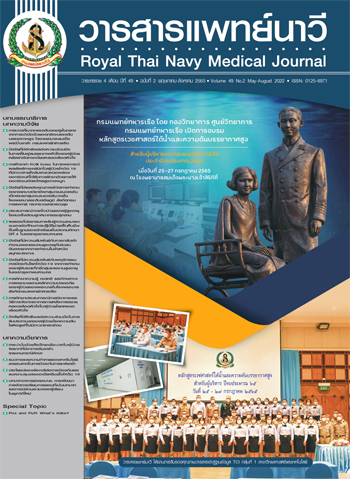Factors Influencing Adherence to Cardiac Rehabilitation in Patients Undergoing Coronary Artery Bypass Graft Surgery
Main Article Content
Abstract
This predictive research was conducted to study cardiac rehabilitation adherence and its influencing factors among coronary artery disease patients who underwent coronary artery bypass graft surgery for 3 - 12 months. One hundred eight participants were recruited using simple random sampling from the outpatient department of hospitals under the Ministry of Defense in Bangkok. Data were collected from August to November 2021. Research instruments consisted of the demographic data record form, the Charlson comorbidity index, 12-item short form health survey, perceived barriers to cardiac rehabilitation questionnaire, family support questionnaires, and adherence to cardiac rehabilitation questionnaires. Data were analyzed using descriptive statistics and multiple regression analysis.
The results showed that the participants had a relatively high mean of adherence to cardiac rehabilitation (Mean = 42.35, SD = 4.75). Perceptions of health together with perceived barriers to cardiac rehabilitation and family support could explain total variance of 31 % (Adjusted R2 = .31, p < .001) for adherence to cardiac rehabilitation. Meanwhile, co-morbidities had no significant influence on adherence to cardiac rehabilitation. The findings suggest that nurses should develop a program or guideline to promote adherence to cardiac rehabilitation on patients undergoing coronary artery bypass graft surgery by promoting their appropriate health perceptions and the care from family support depending on their cardiac rehabilitation barriers for preventing recurrent coronary artery disease.
Article Details

This work is licensed under a Creative Commons Attribution-NonCommercial-NoDerivatives 4.0 International License.
References
Virani SS, Alonso A, Benjamin EJ, Bittencourt MS, Callaway CW, Carson AP, et al. Heart disease and stroke statistics-2020 update: a report from the American Heart Association. Circulation 2020;141(9):e139-e596.
Bureau of Policy and Strategy, Office of The Permanent Secretary Ministry of Public Health. The number and rate of heart disease patients (I20-I25). [Internet]. [cited 2019 December 15]. Available from: http://thaincd.com/information-statistic/ non-communicable-disease-data.php. (in Thai).
Neumann FJ, Sousa-Uva M, Ahlsson A, Alfonso F, Banning AP, Benedetto U, et al. 2018 ESC/EACTS Guidelines on myocardial revascularization. European Heart Journal 2019;40(2):87-165.
The Society of Thoracic Surgeons of Thailand. Statistics of heart surgery in Thailand 2001 - present. [Internet]. [cited 2020 July 10]. Available from: https://thaists.org/en/stat-2564/. (in Thai).
Alkhouli M, Alqahtani F, Alreshidan M, Cook CC. Incidence, predictors, and outcomes of early acute myocardial infarction following coronary artery bypass grafting. The American Journal of Cardiology 2019;124(7):1027-30.
Bellmann B, Lin T, Greissinger K, Rottner L, Rillig A, Zimmerling S. The beneficial effects of cardiac rehabilitation. Cardiology and Therapy 2020;9(1):35-44.
World Health Organization. Adherence to long –term therapies evidence for action. Geneva: World Health Organization; 2003.
Sumner J, Grace S L, Doherty P. Predictors of cardiac rehabilitation utilization in England: results from the national audit. Journal of the American Heart Association 2016;5(10):1-7.
Janssen V, Gucht V, van Exel H, Maes S. A self-regulation lifestyle program for post-cardiac rehabilitation patients has long-term effects on exercise adherence. Journal of Behavioral Medicine 2014;37(2):308-21.
Srichaya P, Nunthaitaweekul P, Aungsuroch Y. Predicting factors of dietary behaviors in patients with coronary artery disease. Royal Thai Navy Medical Journal 2018;45(3):527-43. (in Thai).
Salari A, Hasandokht T, Mahdavi-Roshan M, Kheirkhah J, Gholipour M, Pouradollah M. Risk factor control, adherence to medication and follow up visit, five years after coronary artery bypass graft surgery. Journal of Cardiovascular and Thoracic Research 2016;8(4):152-57.
Pender NJ, Murdaugh CL, Parson AM. Health promotion in nursing practice. 6th ed. Boston: Julie Levin Alexander; 2011.
Ge C, Ma J, Xu Y, Shi Y J, Zhao CH, Gao L, et al. Predictors of adherence to home-based cardiac rehabilitation program among coronary artery disease outpatients in China. Journal of Geriatric Cardiology 2019;16(10):749-55.
Chintapanyakun T, Ua-Kit A, Chaiyaro S. Predicting factors of health status among patients after coronary artery bypass graft surgery. Thai Journal of Cardio-Thoracic Nursing 2017;28(1):96-110. (in Thai).
Mohsenipoua H, Majlessi F, Shojaeizadeh D, Rahimiforooshani A, Ghafari R, Habibi V. Predictors of health-promoting behaviors in coronary artery bypass surgery patients: an application of Pender’s health promotion model. The Iranian Red Crescent Medical Journal 2016;18(9):1-9.
Division of Medical Information, Naval Medical Department. Statistical report for the year 2019. [Internet]. [cited 2021 February 1]. Available from: https://www.spph.go.th/spph-data.php?gid=92. (in Thai).
Tabachnick BG, Fidell LS. Using multivariate statistics. 5th ed. New York: Allyn and Bacon; 2007.
Brooke P, Bullock R. Validation of a 6 item cognitive impairment test with a view to primary care usage. Int J Geriatr Psychiatry 1999;14(11):936-40.
Aree-Ue A, Youngcharoen P. The 6 item cognitive function Test-Thai version: Psychometricproperty testing. Rama Nurse Journal 2020;26(2):188-202. (in Thai).
Charlson ME, Pompei P, Ales KL, Mackenzie CR. A new method of classifying prognostic comorbidity in longitudinal studies: development and validation. Journal of Chronic Disease 1987;40(5):373-83.
Ware JE, Kosinski M, Keller SD. A 12-item Short-Form Health Survey: construction of scales and preliminary tests of reliability and validity. Medical Care 1996;34:220-33.
Polsook R, Yunibhand J, Ua-Kit A. Selected factors related to health recommendations of patients with coronary artery disease. Journal of Nursing Science Chulalongkorn University 2007;19(1):108-20. (in Thai).
Malaee M. Effects of family social support program on perceived family social support and health promoting behaviors in ischemic heart patients. [Master’s Thesis, Faculty of Nursing]. Burapha University; 2006. (in Thai).
Khemthong A, Sangchan H, Naka K. Relationship between cardiac rehabilitation behaviors and quality of life among patients post coronary artery bypass graft. Songklanagarind Journal of Nursing 2018;38(3):1-11. (in Thai).
Ruano RA, Pena GC, Abu AE, Raposeiras S, Meindersma E, et al. Participation and adherence to cardiac rehabilitation programs: a systematic review. International Journal of Cardiology 2016;223:436-43.
Tongtiam W, Tantikosoom P, Jitpanya C. Factors related to physical activity in patients with cardiovascular disease: synthesis of research in Thailand. Journal of The Police Nurses 2016;8(1):34-43. (in Thai).
Waiwaree D, Sindhu S, Utriyaprasi K, Slisatkorn W. Factors predicting functional status in patients post coronary artery bypass graft. Thai Journal of Cardio-Thoracic Nursing 2017;28(2):126-39. (in Thai).

